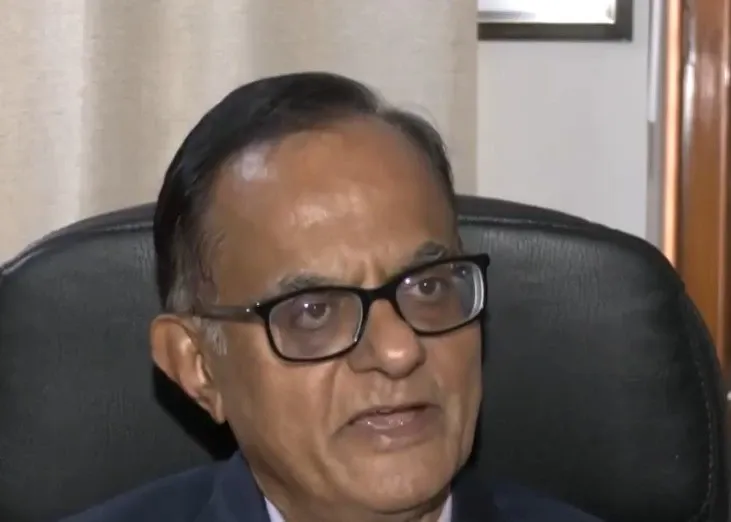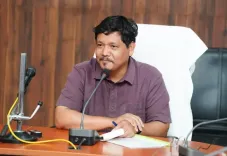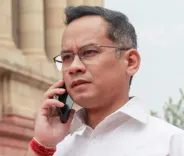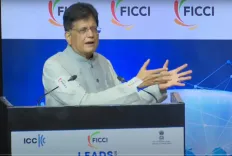How is PM Modi’s vision propelling science and technology growth?

Synopsis
Key Takeaways
- PM Modi's vision is pivotal in India's science and technology growth.
- India has launched significant AI initiatives to tackle global challenges.
- The recognition of leaders like Ajay Sood highlights India's contributions to public affairs.
- AI is seen as an assistive technology, reshaping service sectors.
- India's scientific advancements give it a competitive edge over regional peers.
New Delhi, May 4 (NationPress) Prof. Ajay Kumar Sood, Principal Scientific Adviser to the Government of India, attributed the advancements in the field of science and technology in recent years to Prime Minister Narendra Modi's visionary leadership and commitment to harnessing science and technology across various platforms.
Addressing challenges related to AI, Sood, who has recently been inducted as an International Honorary Member of the American Academy of Arts and Sciences, emphasized that India is strategically positioned to tackle these AI challenges due to the launch of a significant national AI mission. He highlighted the necessity for India to ethically and inclusively leverage AI's capabilities.
Here are some highlights from an exclusive interview with IANS:
IANS: Your election as an International Honorary Member of the American Academy of Arts and Sciences is commendable. How does this recognition relate to Prime Minister Modi's guidance?
Ajay Sood: I am genuinely honored by this recognition. Established in 1780, this academy is renowned for acknowledging leadership and excellence across the arts and sciences. It signifies our contributions to public affairs and policy.
This recognition is especially significant considering the substantial advancements in science and technology under Prime Minister Modi's leadership over the past few years. The role of the Principal Scientific Advisor in shaping technology policy is crucial. This honor reflects not just my efforts but also the dedication of the entire nation.
In a way, this accolade celebrates the remarkable growth of science and technology in our country. Among the international members, I represent India alongside two other esteemed individuals of Indian origin: Satya Nadella, CEO of Microsoft, and C. Jagdish, President of the Australian Academy of Sciences. This recognition is indeed a proud moment for all of us.
One reason for my humility regarding this honor is the illustrious individuals who have been inducted into this academy before me, including the likes of Albert Einstein, Winston Churchill, and Nelson Mandela. Their legacy makes this recognition even more humbling.
IANS: What has been the impact of the Indian diaspora on the global stage? How has the perception of India evolved over the past decade?
Ajay Sood: India is making a significant impact across all facets of science and technology. Indian leadership is prominently visible in top global companies, and the country is gaining respect for its innovative culture. Under Prime Minister Modi's guidance, India has initiated numerous missions, such as the quantum mission, AI mission, and green hydrogen mission, which collectively narrate India's growth story in science and technology.
IANS: How prepared is India to face AI-related challenges and foster innovation?
Ajay Sood: India is well-equipped to confront AI challenges, particularly with the launch of a comprehensive national AI mission. The Principal Scientific Advisor's office plays an essential role in this initiative. AI is poised to revolutionize our lives, affecting both our social and scientific spheres, and we must harness its potential to be leaders rather than followers.
The mission encompasses seven verticals, all actively progressing. Exciting developments are underway, including the announcement of India's LLM foundation model and substantial financial backing.
IANS: What changes will AI bring to the work environment in nations like India?
Ajay Sood: AI serves as both an assistive and disruptive technology, reshaping how we approach our work. Service-oriented sectors will experience significant changes due to AI integration. Rather than fearing disruption, we should focus on utilizing technology to enhance services and introduce innovative products, moving away from outdated models.
AI will undeniably alter our lives, and we must ensure its ethical, transparent, and inclusive use, especially in light of safety concerns. The government is actively formulating an AI safety policy to address these aspects.
IANS: How do India's scientific advancements provide an advantage over Pakistan, given the border challenges?
Ajay Sood: There is no comparison. Our country's advancements in fields like atomic energy, space exploration, digital transformation, and clean energy demonstrate that we are at the forefront. All science and technology policies and frameworks involve collaboration among academia, industry, government, and policymakers, making direct comparisons irrelevant.
IANS: How should India respond to China's challenge in scientific innovation?
Ajay Sood: We need to position ourselves effectively and assert India's potential to lead as a product nation, not just a service economy. Achieving this requires enhancing our design capabilities and progressing from design to production and marketing.
While challenges exist, they shouldn't deter us from excelling in science and technology. Instead, they motivate us to stay relevant and innovative, which is crucial for our nation's future.
IANS: How has Prime Minister Modi's emphasis on technology impacted your experience working with him?
Ajay Sood: Prime Minister Modi is unwaveringly committed to science and technology, viewing it as a means to improve the lives of our citizens. His speeches from the Red Fort underscore this focus, emphasizing new initiatives like the quantum mission and AI mission, which are central to the government's policies. The explosion of the start-up culture is a testament to this commitment, with the number of start-ups soaring from around 470 to 170,000 in just over a decade, supported by government initiatives.
IANS: How has PM Modi's emphasis on scientific innovation transformed New India?
Ajay Sood: PM Modi's focus has been on democratizing science and technology. A prime example is the digital transformation, which has made technology accessible and affordable, ensuring transparency. His clear direction emphasizes that innovation, alongside science and technology, will nurture the vision of a developed Bharat by 2047. Initiatives like Chandrayaan and Mangalyaan exemplify how Prime Minister Modi's vision centers science and technology in our growth narrative.







